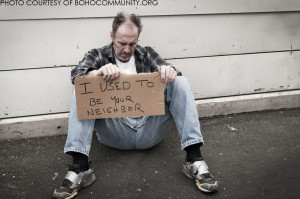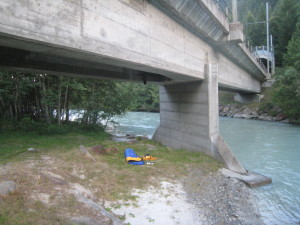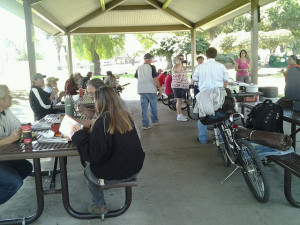 When I was a kid, “homeless” meant that you had lost your job and couldn’t pay your rent so you took turns living with relatives until you found a job. No one I knew lived on the street, under a bush, or in a tent in a canyon. I had never heard of such a thing.
When I was a kid, “homeless” meant that you had lost your job and couldn’t pay your rent so you took turns living with relatives until you found a job. No one I knew lived on the street, under a bush, or in a tent in a canyon. I had never heard of such a thing.
When I grew up, I got married and moved to California where I discovered that there were people literally living in the street, under bridges, and in the canyons surrounding our city.
One fine summer day I decided to go to my favorite beach to soak up some rays. When I arrived I ran into an old friend I hadn’t seen since the previous year.
“Hey Rick. I haven’t seen you around.”
“Yeah, I kind of fell off the map. I lost my job last fall and couldn’t find another one. I lost my apartment and ended up on the street.”
“You didn’t have a place to live?” I asked.
“No. I was living in a sleeping bag under a bridge behind the Warehouse restaurant and spending the day in a park a couple of miles away.”
“Are you serious?”
“Yeah. I’m serious. But it’s worse than that. I almost died in January.”
“You did? What happened?”
“Remember that ice storm we had?” Rick asked.
“Yes, I remember.”
“I was at the park when it started to rain. By the time I got back to the sleeping bag I had stowed under the bridge I was soaked to the skin. I crawled into the bag and got it wet too. The temperature was dropping and it started sleeting. I started shivering and shaking and couldn’t get warm.”
“That’s terrible. What happened?”
“Sometime during the night I passed out. The next morning someone found me under the bridge and thought I was dead. They called the cops, who checked me and found out I was still alive, but unconscious. The cops called an ambulance and I ended up spending five days in the hospital. They told me I almost died. My body temperature had dropped below what it’s supposed to be to keep you alive.”
I wanted to cry. How could this have happened to my friend? “Rick, you could have stayed at our house!” I told him.
“I lost your phone number. I didn’t want to bother anyone. I thought it would be a temporary thing. When I started sleeping under the bridge it was only getting down in the sixties at night.”
“Are you still living under the bridge?”
“No. Someone I know ran into me in the hospital and he helped me get a job at a fast food place. After I worked there a couple of months I found another job in my field. I’m back in an apartment and doing good now.”
“Wasn’t there some organization or church that could have helped you when you were on the street?”
“There were these people who fed us lunch every day in the park downtown. I’m not sure who they were, but I don’t think they had any place for me to get off the street.”
“They fed us lunch? Who is ‘us’?”
“Me and the other homeless people around here.”

“You’re saying there are other homeless people here?”
“Uh huh. Lots of them.”
“Where are they?”
“Living in the cracks where you don’t see them. Go downtown and you’ll walk right by them. Some of them are dressed a little shabby. Some of them look like anyone else. If you really want to meet some of them, go to the park downtown at noon. They’ll be there lined up for lunch.”
I was shocked. Homeless people in my town? How had I missed them?
Rick and I spent a couple of hours lying in the sun and talking. That evening at dinner I told Rick’s story to my wife.
After that, we didn’t think much more about it.
A couple of years later a friend asked if I could prepare lunch one day the following week for the homeless. The idea made me uncomfortable. What if I caught a disease from one of them? What would I do if one of them wanted money, or wanted to stay at my house?
 Reluctantly, I agreed to make lunch for about sixty people. I was about as enthusiastic as I would have been if I had been planning to go to Calcutta to visit the slums. I did not know what to expect when I would actually meet sixty homeless people.
Reluctantly, I agreed to make lunch for about sixty people. I was about as enthusiastic as I would have been if I had been planning to go to Calcutta to visit the slums. I did not know what to expect when I would actually meet sixty homeless people.
When the day to feed the homeless arrived, the people I met, people who had been unknown and faceless to me suddenly were sitting beside me as we shared stew, bread, and cherry cobbler.
I had expected filthy, stinking drunks with whiskey bottles in their hands and baggies of weed in their pockets.
Instead, the homeless people I met were not that much different from a lot of people I knew.
Some were poorly dressed. Some carried a backpack and sleeping bag. A few had shopping carts filled with their belongings. Several were probably under the influence of drugs or perhaps alcohol. But most of them looked and acted like I thought I might look and act if I were down on my luck.
How can I help people like these? Should I even be helping them? Maybe helping them just encourages them to continue living under bridges. I don’t have the resources to help them get into permanent housing. Shouldn’t the government take care of them?
“Thanks man,” one man said after finishing his lunch. “I want to let you know how much I appreciate this. This is the only time I’ll eat today and you gave me plenty to fill my stomach until tomorrow.” Many of the people who ate the lunch I had prepared said “Thank you, the food was good.” They had good manners, were respectful, well-spoken, and kind.
The homeless people were not that dissimilar to me.
This was quite a shock to me, and I began to ask questions that changed my view of homeless people forever.
How did these people end up on the street?
Do I know people who have ended up on the street?
Do I know people who are in danger of losing their homes?
I thought the poor and homeless lived in large cities like New York and Los Angeles. How many live in my own “backyard”?
Something I had heard somewhere popped into my mind: “If just a cup of water I place within your hand, then just a cup of water is all that I demand.”
I can’t give what I don’t have. But I do have a cup of water and I like these people. That’s a good place to start.
I knew that while I couldn’t save them all, and maybe I couldn’t even save any, I could at least give them a warm meal, a cup of water, or a new pair of socks.
But how do I figure out who among the homeless needs the most help? And how can I determine what the best way is for me to help?
In the following posts we will look at how my wife and I along with a few friends have been answering those questions.
Until then, what sorts of questions do you have about loving the homeless? Leave your questions in the comment section.
There is so much need in the world!
And YOU can help.
Fill out the form below to receive several emails about how to love and serve the poor and homeless.
(Note: If you are a member of RedeemingGod.com, login and then revisit this page to update your membership.)




awesome blog!
if you could help me get a young person off the streets, how would you go about it
Add to these distressing thoughts that around 20% of the homeless are Veterans. Many of the people at our homeless shelter have minimum paying jobs but it’s just not enough to pay rent, medical bills and food. This is a topic near & dear to my heart. Thank you for your work and bringing attention to those in need. Each of us (through unforeseen circumstances) is about a step away from being in their shoes.
Here in San Diego, which is a major military installation, we have seen lots of Veterans on the streets. When some of our guys completed their tour in Iraq or Afghanistan they got off the boat here in San Diego, called wherever was once “home” and discovered they had no job, home, girlfriend or wife to return to, and soon ended up on the street. Fortunately many of them didn’t stay there forever, but some, especially those with drug issues, found it difficult to get off the street.
We are seeing less of this than in past years. Most of the veterans we see on the street have been there for years (which in itself is a national shame) and haven’t found it easy to get out of that situation. However, even some of the old-timers have been placed in housing in the past year or two. There are more, however, who want to get off the street.
Seven years ago we thought we had saw a need for people who were underemployed or on fixed incomes needing a free night out. So we started a free spaghetti meal on the last Sunday of the month from 5-7 Pm. This is a restaurant quality meal with wait staff and entertainment and absolutely no preaching. Over the years more and more homeless have been coming, which shows there is a need even in an upper middle class suburb. Seven years ago we would serve 40 meals and now we average 160, with 60 who appear homeless.
My proudest moment was when a high school volunteer came in the kitchen and asked if she could have a plate of food so she could eat with a homeless man because he was all alone.
Growing up in NYC, I was used to seeing the homeless. My mother always raised me on the premise of “Never turn your nose up to these people because: 1) That may be you someday, and 2) “That may be GOD walking around, trying to see if you truly love your fellow man, as a Christian is supposed to.” Growing up Catholic, it was instilled in me that the first rule of being Catholic, is to have compassion. I’ve never forgotten my mother’s words…and to this day; I will give the last dollar I have to anyone I see, that is living on the street. I am blessed, because I’ve come close to being homeless and but for the Grace of God…my husband and I survived some extremely difficult times.
Me and my husband are three weeks iñ to serving the homeless once a week on Saturday in Galveston Texas. Every Saturday at 8:00 am the givers and receivers meet for us to give to them and they bless us. They have choices of two hot meals, one breakfast and one beans and rice and cornbread. It starts with a short devotional and then our guests are free to go from table to table to collect what is being offered by those people on this day. I took 30 lunch bags of food goodies and hygiene items. They went quickly. There were a lot of needy people there today . Then when I ran out of filled bags, they wanted my empty grocery bags to put stuff in. 😀
I have just recently started feeding the homeless in my community. I found some to be very grateful. Very quiet people. Some have mental problems, all are alcoholics. Recovering drug addicts but still self medicating. Others scamming people and claiming to be preaching “the gospel”. I want to help more. Where do I get more informed.
If a homeless man is saying he will work for food and money. Should I let him help my husband do yardwork at our house. Why or why not? It could help my husband and help him. Any thoughts?
Becky